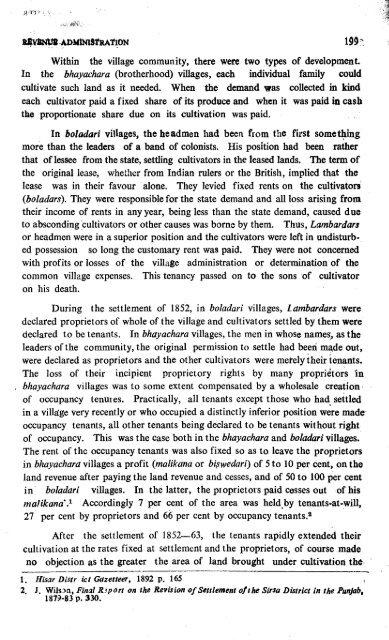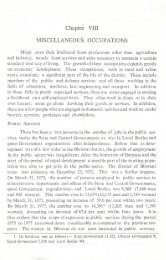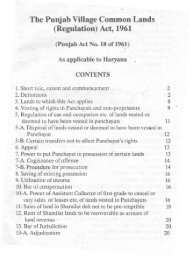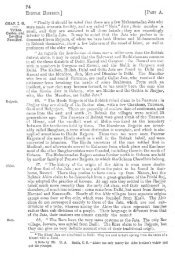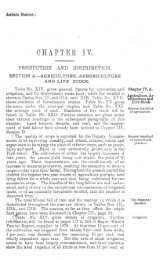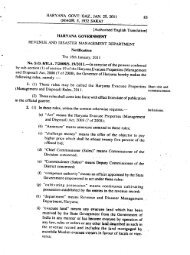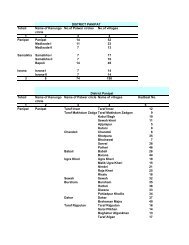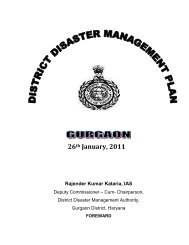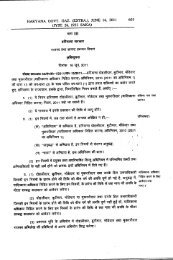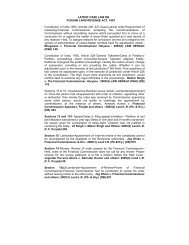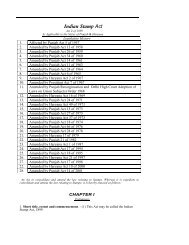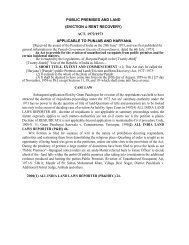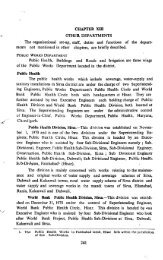CHAPTER XI REVENUE ADMINISTRATION Sirsa seems to beinthe ...
CHAPTER XI REVENUE ADMINISTRATION Sirsa seems to beinthe ...
CHAPTER XI REVENUE ADMINISTRATION Sirsa seems to beinthe ...
You also want an ePaper? Increase the reach of your titles
YUMPU automatically turns print PDFs into web optimized ePapers that Google loves.
Within the village community, there were two types of development.<br />
In the bhayachara (brotherhood) villages, each individual family could<br />
cultivate such land as it needed. When the demand was collected in kind<br />
each cultiva<strong>to</strong>r paid a fixed share of its produce and when it was paid in cash<br />
the proportionate share due on its cultivation was paid.<br />
In boladari villages, the headmen had been flOm the first somet~dng<br />
more than the leaders of a band of colonists. His position had been rather<br />
that of lessee from the state, settling cultiva<strong>to</strong>rs in the leased lands. The term of<br />
the original lease, whether from Indian rulers or the British, implied that the<br />
lease was in their favour alone. They levied fixed rents on the cultiva<strong>to</strong>rS<br />
(boladars). They were responsible for the state demand and all loss arising from<br />
their income of rents in any year, being less than the state demand, caused due<br />
<strong>to</strong> absconding :cultiva<strong>to</strong>rs or other causes was borne by them. Thus, Lambardars<br />
or headmen were in a superior position and the cultiva<strong>to</strong>rs were left in undisturbed<br />
possession so long the cus<strong>to</strong>mary rent waS paid. They were not concerned<br />
with profits or losses of the village administration or determination of the<br />
common village expenses. This tenancy passed on <strong>to</strong> the sons of cultiva<strong>to</strong>r<br />
on his death.<br />
During the settlement of 1852, in boladari villages, Lambardars were<br />
declared proprie<strong>to</strong>rs of whole of the village and cultiva<strong>to</strong>rs settled by them were<br />
declared <strong>to</strong> be tenants. In bhayachara villages, the men in whOSename~, asthe<br />
leaders of the community, the original permission <strong>to</strong> settle had been ma,de out,<br />
were declared as proprie<strong>to</strong>rs and the other cultiva<strong>to</strong>rs were merely their tenants.<br />
The loss of their incipient proprie<strong>to</strong>ry rights by many proprie<strong>to</strong>rs 'in<br />
bhayachara villages was <strong>to</strong> some extent compensated by a wholesale creation·<br />
of occupancy tenures. Practically, all tenants except those who had. settled<br />
in a village very recently or who occupied a distinctly inferior position were made<br />
occupancy tenants, all other tenants being declared <strong>to</strong> be tenants without right<br />
of occupancy. This was the Caseboth in the bhayachara and boladari villages.<br />
The rent of the occupancy tenants was also fixed so as <strong>to</strong> leave the proprie<strong>to</strong>rs<br />
in bhayachara villages a profit (malikana or bi~wedari) of 5 <strong>to</strong> 10 per cent, on the<br />
land revenue after paying the land revenue and cesses, and of 50 <strong>to</strong> 100 per cent<br />
in boladari villages. In the latter, the proprie<strong>to</strong>rs paid cesses out of his<br />
mafikana'.l Accordingly 7 per cent of the area was held,by tenants-at-wiIl,<br />
27 per cent by proprie<strong>to</strong>rs and 66 per cent by occupancy tenants.a<br />
After the settlement of 1852-63, the tenants rapidly extended their<br />
cultivation at the rates fixed at settlement and the proprie<strong>to</strong>rs, of course made<br />
no objection as the greater the area of land brought under cultivation th~<br />
1. Hisar Distr kt Gazetteer, 1892 P. 165<br />
2. J. Wilnn, Final R!port on the Revision Of Settlement o/the SirsQDistrict in the Punjab.<br />
1879-83 p. 330.


